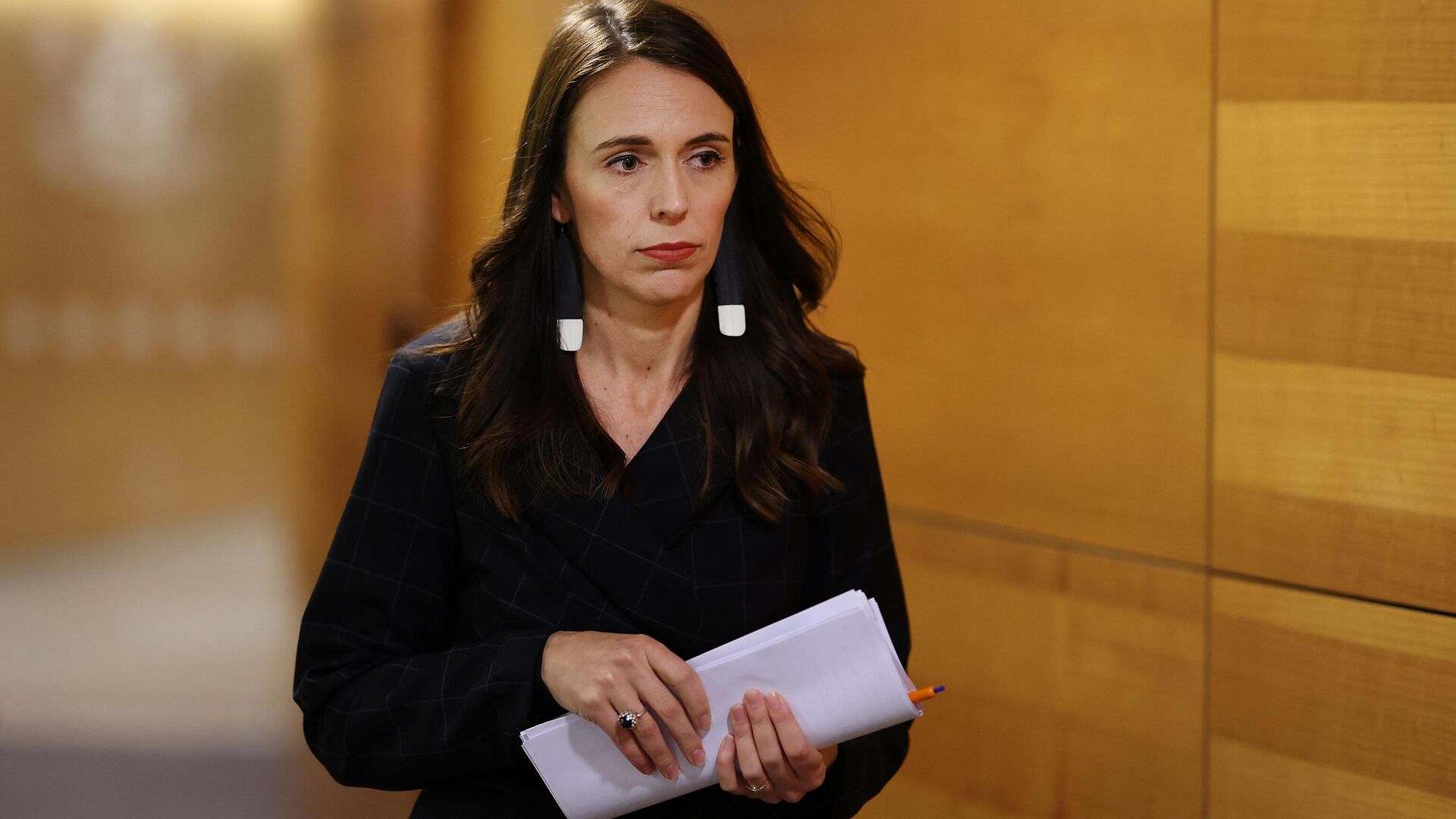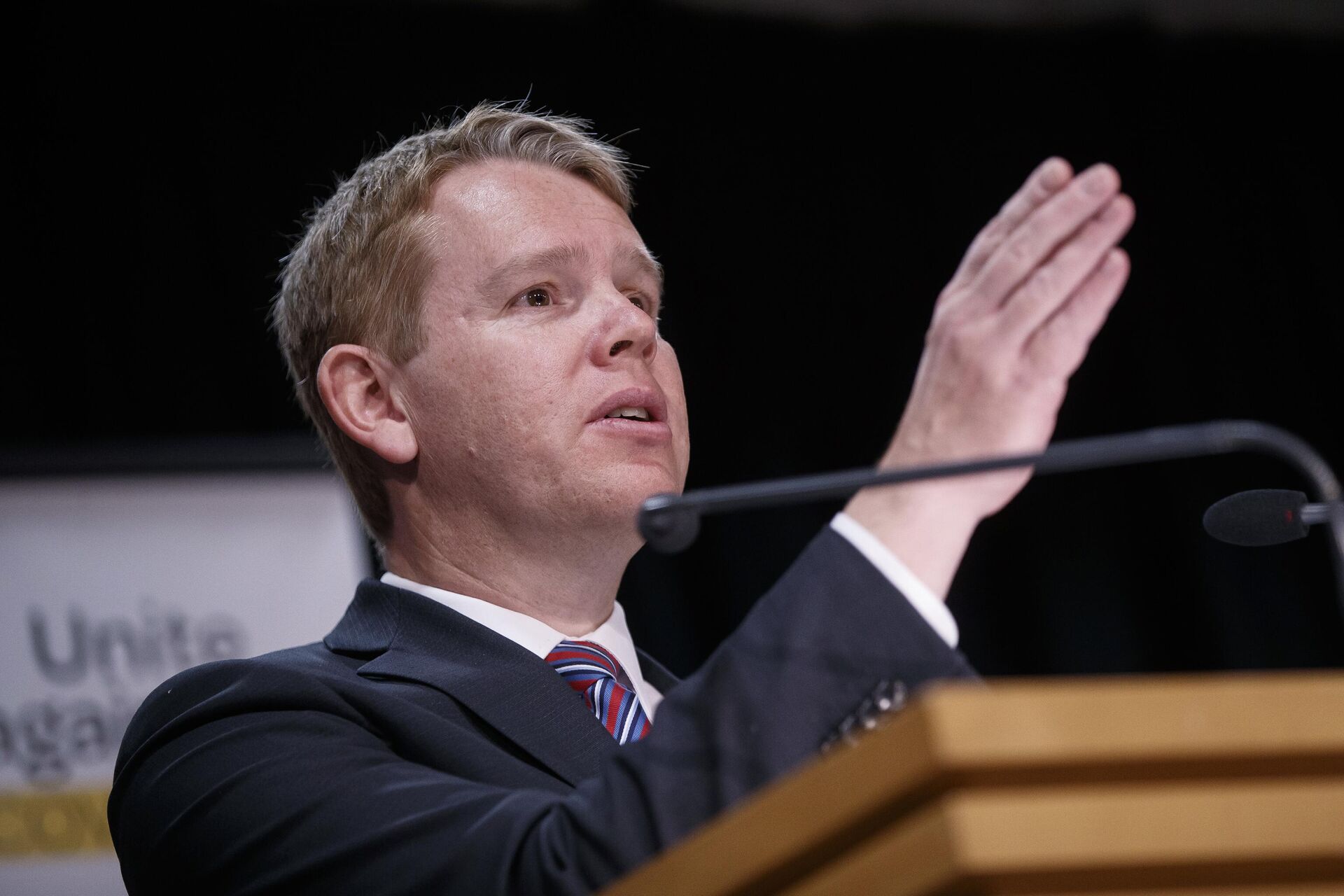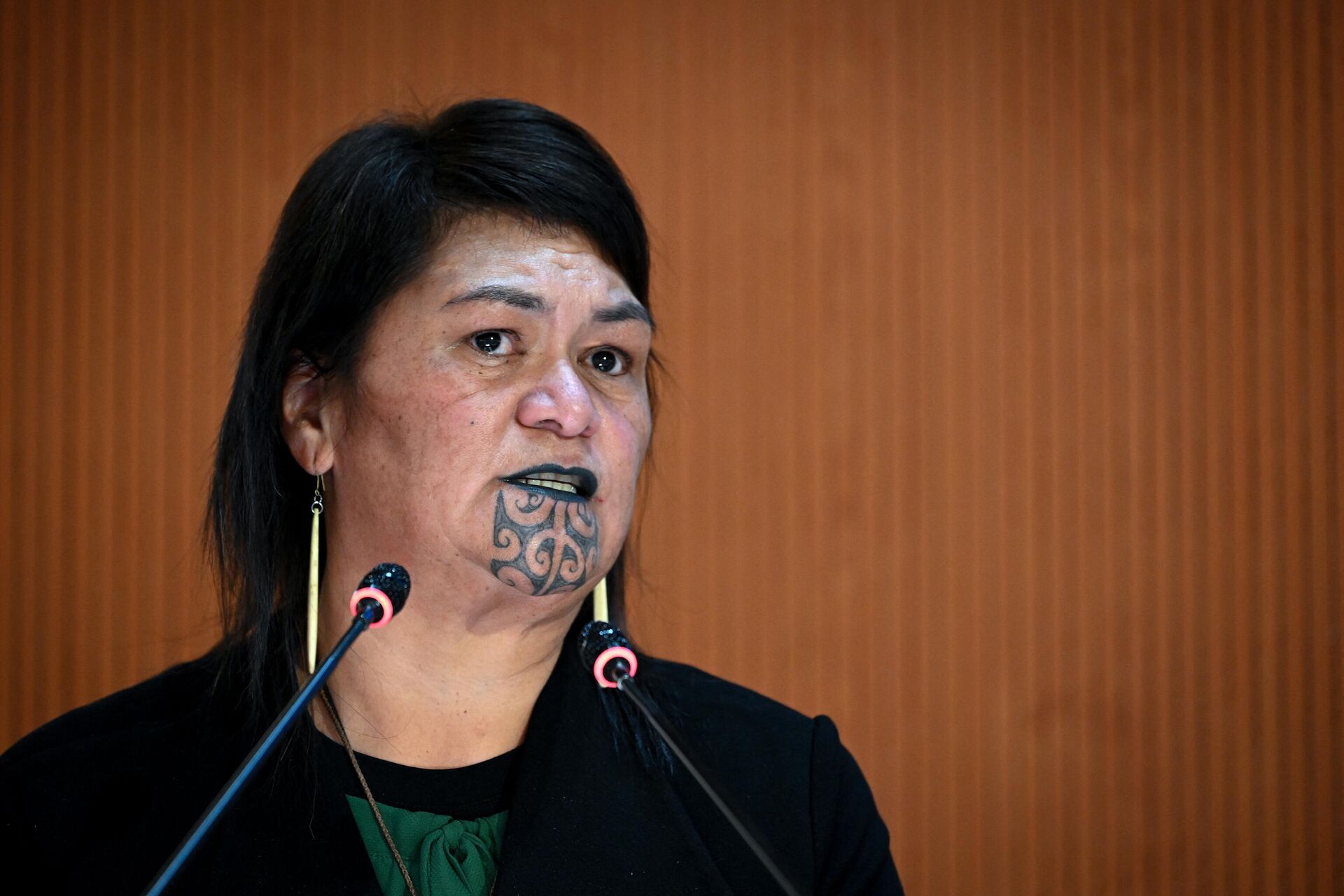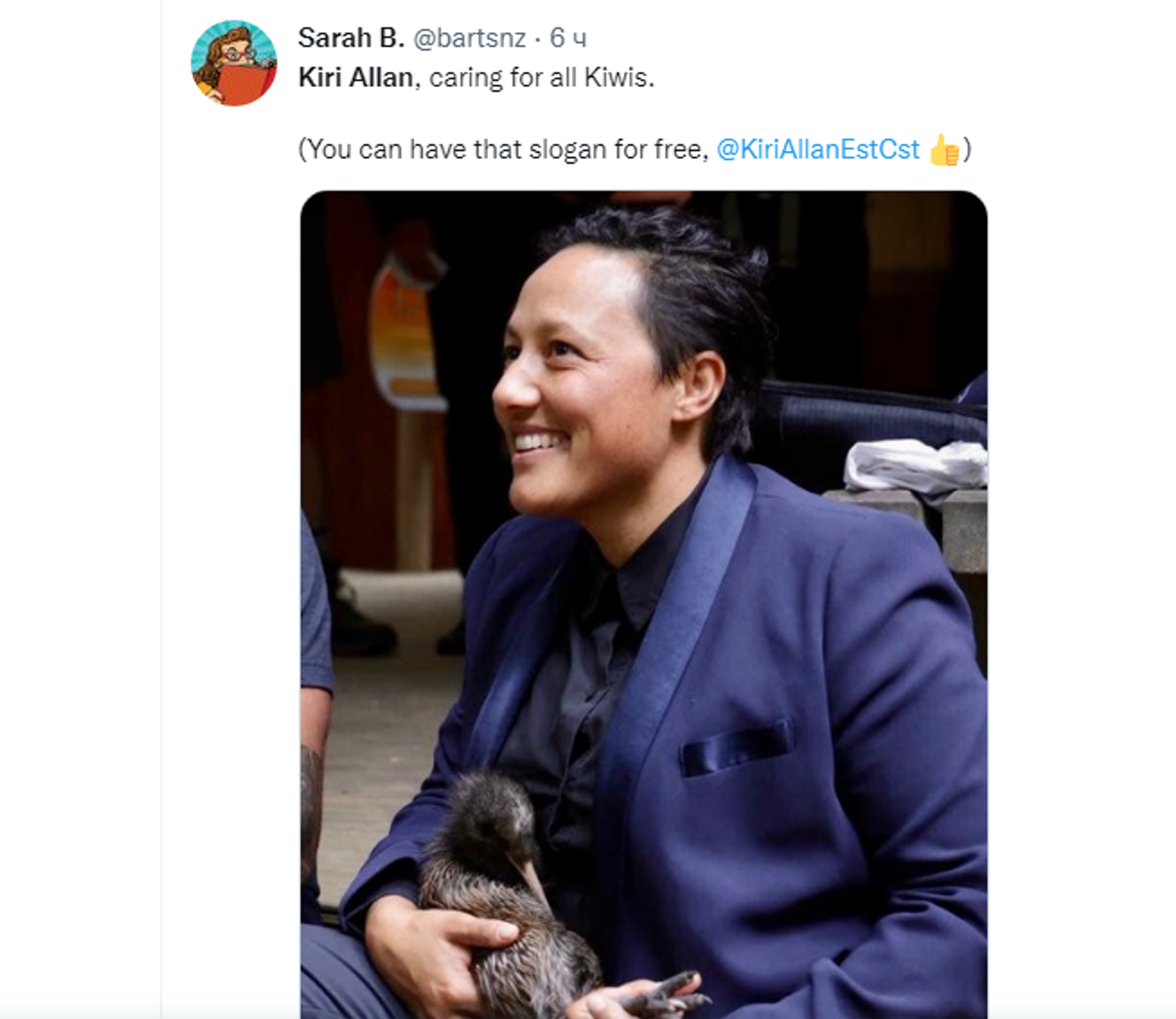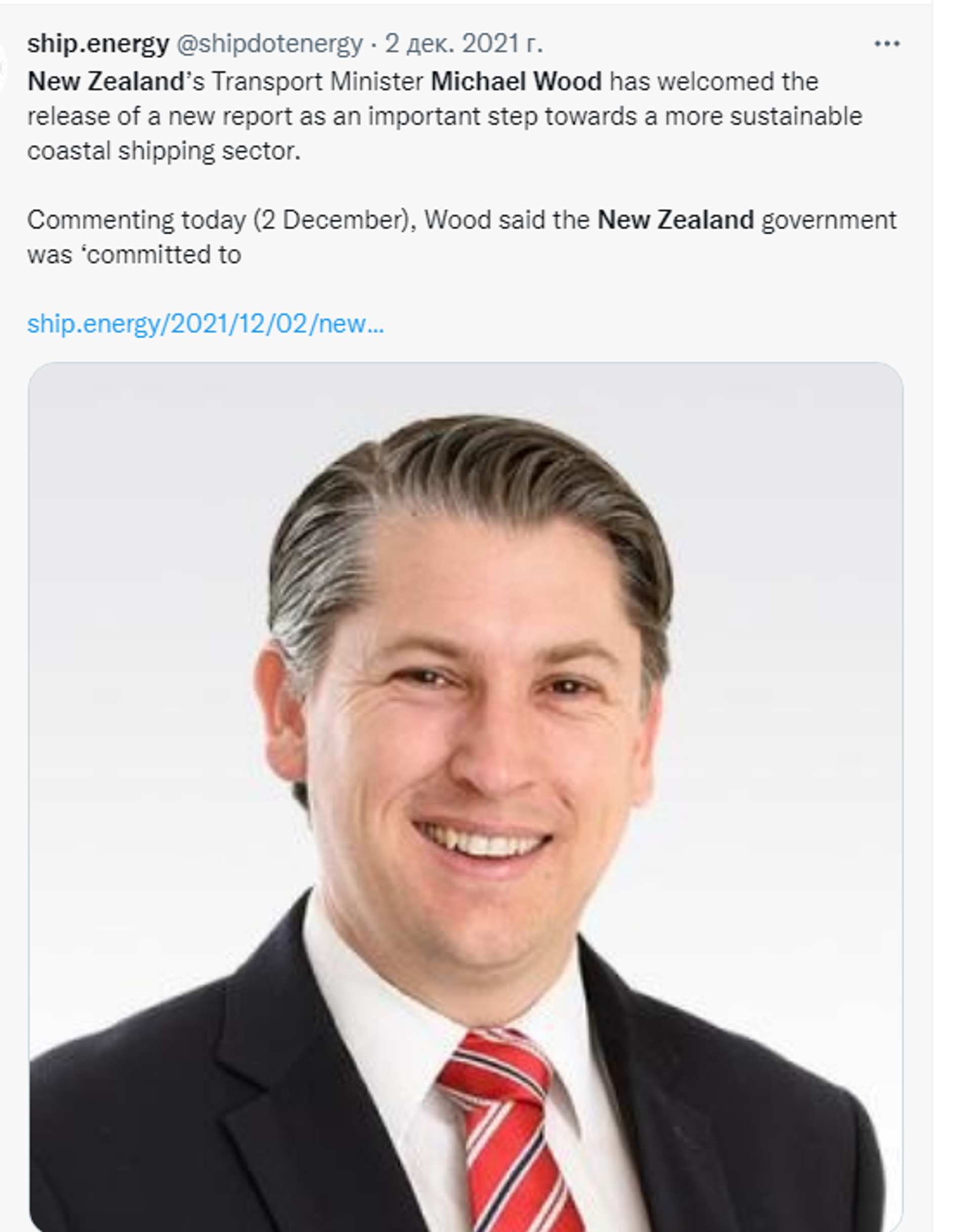https://sputnikglobe.com/20230119/new-zealand-pms-resignation-who-is-to-take-the-helm-after-ardern-leaves-1106487921.html
New Zealand PM's Resignation: Who is to Take the Helm After Ardern Leaves?
New Zealand PM's Resignation: Who is to Take the Helm After Ardern Leaves?
Sputnik International
Ardern became the world's youngest female head of government in 2017, when she took up the post of New Zealand's prime minister at the age of 37
2023-01-19T13:39+0000
2023-01-19T13:39+0000
2024-03-11T10:58+0000
sputnik explains
new zealand
jacinda ardern
government
election
https://cdn1.img.sputnikglobe.com/img/07e7/01/13/1106487398_0:160:3073:1888_1920x0_80_0_0_0926cdc0fe1b3029cdb01fc2cbbe7b87.jpg
Fighting back the tears as she unexpectedly announced her resignation during an emotional news conference on Thursday, New Zealand Prime Minister Jacinda Ardern admitted that she "doesn't have enough in the tank" to further do the job.During her five-plus "challenging" years in office, Ardern, whose final day in the position will be February 7, oversaw the Christchurch terror attack and the COVID-19 pandemic, among other events. So how has she tackled all this and now that she is stepping down, who is tipped to become her possible successor? Sputnik answers these and other questions.When Did Arden Propel to Power?Ardern rose to power in 2017, becoming New Zealand's youngest prime minister in its150-year history. A year later, she became the second elected world leader ever to give birth while in office, after Pakistan's Prime Minister Benazir Bhutto did so in 1990. Ardern was elected to a second term by a landslide in October 2020.As leader of the country’s ruling Labor Party and the PM, she received positive coverage from mainstream media, with some commentators referring to a "Jacinda effect" and "Jacindamania".Feminist Icon?Ardern is believed to have become sort of a feminist icon after her response to an interviewer’s question in 2017 about whether she planned to have children. While she initially said that she had no problem answering the question, afterwards, after a separate interviewer made it clear that employers had a right to know whether female employees planned on taking time off from work to have children, Ardern stressed the following:Christchurch Shooting SpreeIn March 2019, Ardern was the first signatory of a national condolence book that she opened in the capital Wellington after 51 people were killed and 49 more injured as a result of shootings in two mosques in Christchurch.In a Parliamentary address at the time, she declared that she would never say the name of the attacker.Responding to the shootings, Ardern announced her government's intention to introduce stronger firearms regulations. She underscored that the Christchurch attack had exposed some weaknesses in New Zealand's gun laws.What Was Ardern's COVID Response?In March 2020, Ardern announced that the government would be requiring anyone entering the country to isolate themselves for 14 days, arguing that the new rules will mean New Zealand has the “widest ranging and toughest border restrictions of any country in the world.” Shortly after, she stated that New Zealand's borders would be closed to all non-citizens and non-permanent residents as of March 20, 2020.Two years later, a lot of Kiwis reacted angrily to the government’s new COVID-19 home isolation rules, with some even suggesting it was a bad joke. The government, however, said in late January 2022 that they were deadly serious about issuing instructions that “household close contacts” of a positive COVID case must isolate for up to 24 days - even if they do not have the virus.This meant that household contacts were required to isolate longer than the actual case themselves, which only had to isolate for two weeks. Those restrictions were screaped only in August 2022.First Gay PM in NZ?Ardern is, in particular, known for unveiling in 2020 what she described as an "incredibly diverse" cabinet that specifically included Grant Robertson, who was thought to be New Zealand's first openly gay deputy prime minister.Asked about the significance of having a gay man as her second in command, Ardern said at the time that Robertson was selected for his leadership abilities, not how he identified. What About Ardern's Successor?The top-four list includes Chris Hipkins, Kiri Allan, Michael Wood, and Nanaia Mahuta of the Labor Party.Local media reports have indicated that a caucus vote would be held on Sunday in order to elect both a new party leader and candidate for New Zealand's next prime minister ahead of the national election on October 14.Chris HipkinsThe 44-year-old is tipped to serve as the country’s new PM even though he was earlier criticized for fronting the government's tough response to the COVID-19 pandemic.Hipkins finally acknowledged that lockdown measures should have been scaled back earlier, including those slapped on New Zealand’s largest city of Auckland, where lockdown lasted 107 days.He became Minister for Police amid a crime wave in the country in the summer of 2022. The politician also serves as Minister for Education and Public Service, additionally holding the post of Leader of the House.Kiri AllanIf elected, Justice Minister Kiri Allan – a relatively new face in New Zealand politics - will become the country's first prime minister of Maori descent and the first openly gay leader.The 39-year-old, who previously served as emergency management minister, briefly took medical leave in 2021 after she was diagnosed with stage 3 cervical cancer. In December 2021, the MP revealed she was cancer-free in an emotional social media post.A New Zealand media outlet reported that Allan “impressed many with her calm control of the threat of tsunami in March 2021. It was later revealed it was the same day she had a medical diagnosis of cervical cancer, which she later underwent treatment for - this earned her extra admiration for her grit”.Michael Wood After the 2017 election, the 42-year-old was appointed as the Parliamentary under-secretary for ethnic communities. In a June 2019 reshuffle, Wood received the role of Chief Whip.Following the 2020 vote, Wood was promoted to the government and got the job of Minister of Transport, Minister for Workplace Relations and Safety, as well as and Deputy Leader of the House.In a mid-2022 cabinet shakeup, he was replaced as Deputy Leader of the House to be provided with the Immigration portfolio.Nanaia Mahuta 52-year-old Nanaia Mahuta, who is known for a traditional facial tattoo that celebrates her Maori heritage, became New Zealand's first female foreign minister after the 2020 election victory.The veteran parliamentarian has long stood for Maori causes as a tribal member of Waikato-Tainui, Ngati Maniapoto and Ngati Manu. The 52-year-old is the daughter of Robert Mahuta, the adopted brother of the late Maori Queen Te Arikinui Dame Te Atairangikaahu.
https://sputnikglobe.com/20200827/new-zealands-christchurch-shooter-brenton-tarrant-sentenced-to-life-in-prison-without-parole-1080288442.html
https://sputnikglobe.com/20220213/new-zealand-deploys-james-blunt-song-to-move-covid-19-protesters-away-from-parliament-1092989035.html
new zealand
Sputnik International
feedback@sputniknews.com
+74956456601
MIA „Rossiya Segodnya“
2023
Oleg Burunov
https://cdn1.img.sputnikglobe.com/img/07e4/09/0b/1080424846_0:0:2048:2048_100x100_80_0_0_3d7b461f8a98586fa3fe739930816aea.jpg
Oleg Burunov
https://cdn1.img.sputnikglobe.com/img/07e4/09/0b/1080424846_0:0:2048:2048_100x100_80_0_0_3d7b461f8a98586fa3fe739930816aea.jpg
News
en_EN
Sputnik International
feedback@sputniknews.com
+74956456601
MIA „Rossiya Segodnya“
Sputnik International
feedback@sputniknews.com
+74956456601
MIA „Rossiya Segodnya“
Oleg Burunov
https://cdn1.img.sputnikglobe.com/img/07e4/09/0b/1080424846_0:0:2048:2048_100x100_80_0_0_3d7b461f8a98586fa3fe739930816aea.jpg
new zealand prime minister jasinda ardern's resignation, covid-19 pandemic, 2019 christchurch shooting spree, new zealand prime minister jasinda ardern's successor
new zealand prime minister jasinda ardern's resignation, covid-19 pandemic, 2019 christchurch shooting spree, new zealand prime minister jasinda ardern's successor
New Zealand PM's Resignation: Who is to Take the Helm After Ardern Leaves?
13:39 GMT 19.01.2023 (Updated: 10:58 GMT 11.03.2024) Ardern became the world's youngest female head of government in 2017, when she took up the post of New Zealand's prime minister at age 37. However, it seems that over the past years she has had enough of governing the country, prompting a race for the vacancy.
Fighting back the tears as she unexpectedly announced her resignation during an emotional news conference on Thursday,
New Zealand Prime Minister Jacinda Ardern admitted that she "doesn't have enough in the tank" to further do the job.
During her five-plus "challenging" years in office, Ardern, whose final day in the position will be February 7, oversaw the Christchurch terror attack and the COVID-19 pandemic, among other events. So how has she tackled all this and now that she is stepping down, who is tipped to become her possible successor? Sputnik answers these and other questions.
When Did Arden Propel to Power?
Ardern rose to power in 2017, becoming New Zealand's youngest prime minister in its150-year history. A year later, she became the second elected world leader ever to give birth while in office, after Pakistan's Prime Minister Benazir Bhutto did so in 1990. Ardern was elected to a second term by a landslide in October 2020.
As leader of the country’s ruling Labor Party and the PM, she received positive coverage from mainstream media, with some commentators referring to a "Jacinda effect" and "Jacindamania".
Ardern is believed to have become sort of a feminist icon after her response to an interviewer’s question in 2017 about whether she planned to have children. While she initially said that she had no problem answering the question, afterwards, after a separate interviewer made it clear that employers had a right to know whether female employees planned on taking time off from work to have children, Ardern stressed the following:
“I decided to talk about it, it was my choice…, but for other women it is totally unacceptable in 2017 to say that women should have to answer that question in the workplace. It is the woman’s decision about when they choose to have children. It should not predetermine whether or not they are given a job or have job opportunities.”
Christchurch Shooting Spree
In March 2019, Ardern was the first signatory of a national condolence book that she opened in the capital Wellington after 51 people were killed and 49 more injured as a result of shootings in two mosques in Christchurch.
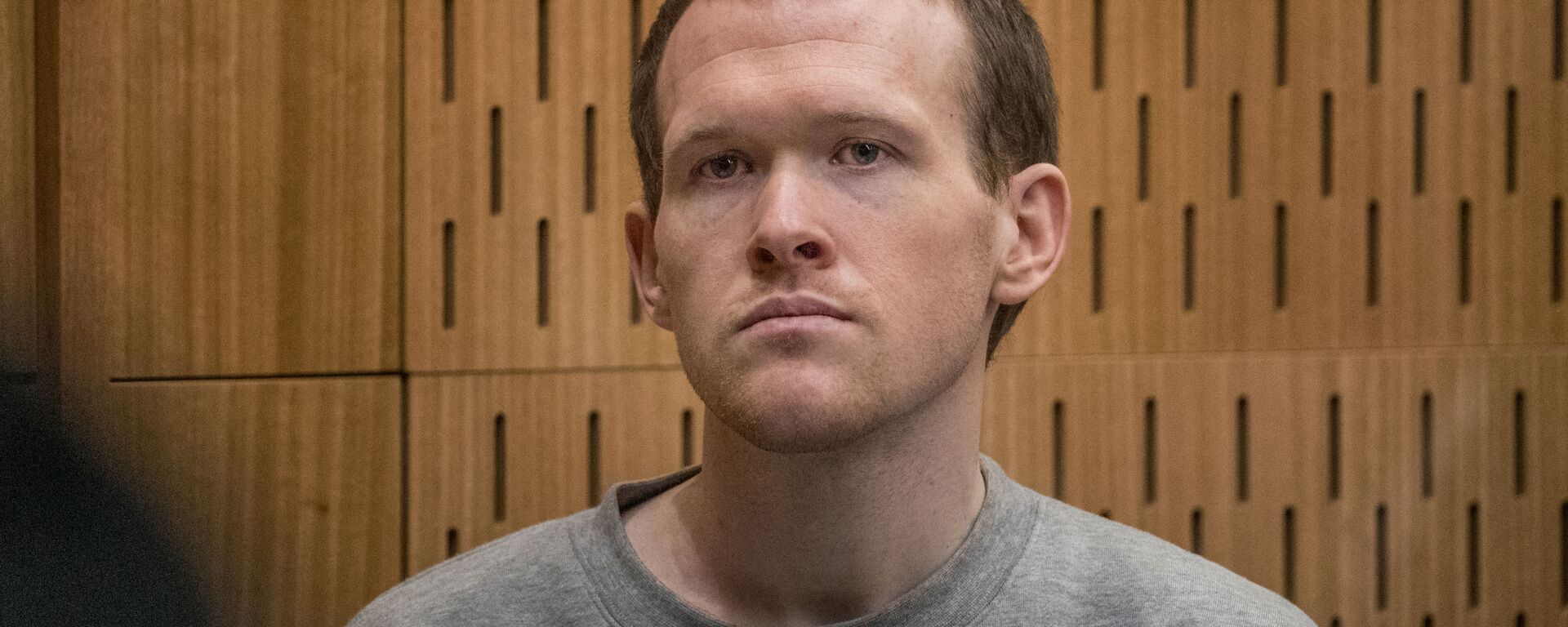
27 August 2020, 02:03 GMT
In a Parliamentary address at the time, she declared that she would never say the name of the attacker.
Responding to the shootings, Ardern announced her government's intention to introduce stronger firearms regulations. She underscored that the Christchurch attack had exposed some weaknesses in New Zealand's gun laws.
What Was Ardern's COVID Response?
In March 2020, Ardern announced that the government would be requiring anyone entering the country to isolate themselves for 14 days, arguing that the new rules will mean New Zealand has the “widest ranging and toughest border restrictions of any country in the world.” Shortly after, she stated that New Zealand's borders would be closed to all non-citizens and non-permanent residents as of March 20, 2020.
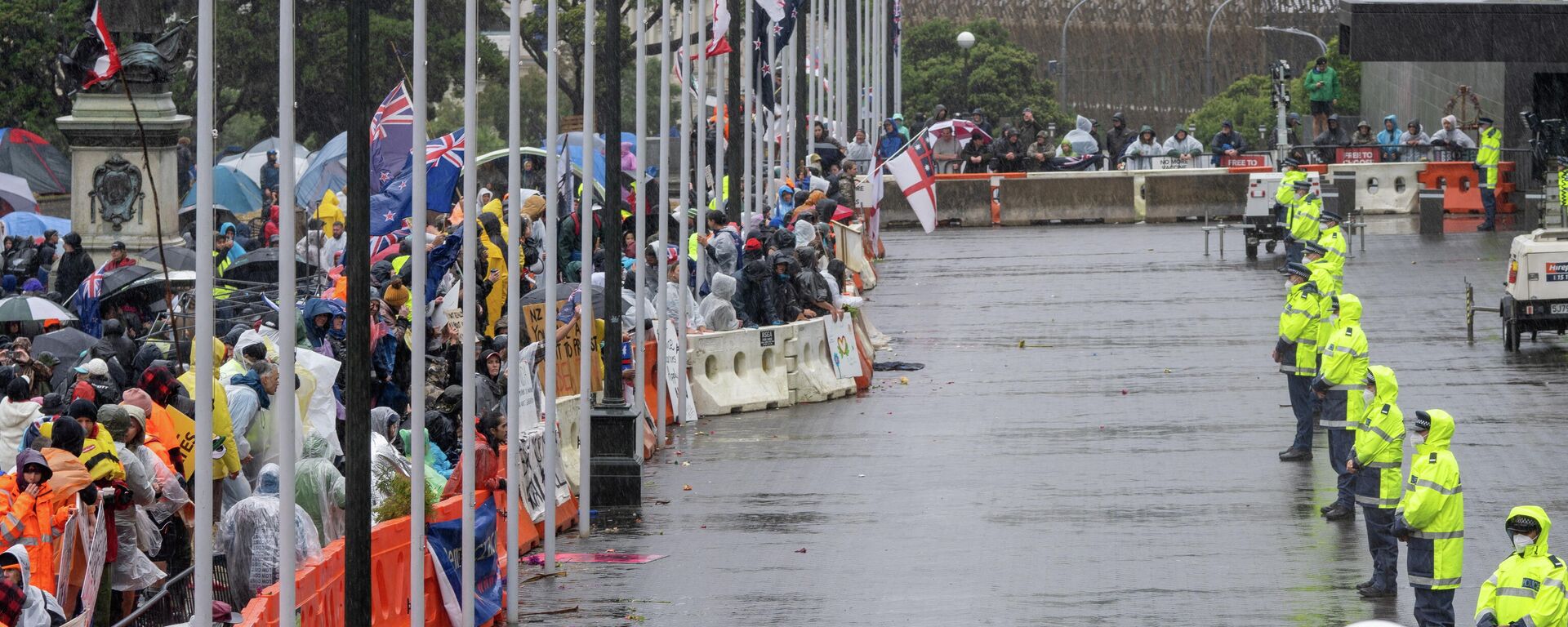
13 February 2022, 14:48 GMT
Two years later, a lot of Kiwis reacted angrily to the government’s new COVID-19 home isolation rules, with some even suggesting it was a bad joke. The government, however, said in late January 2022 that they were deadly serious about issuing instructions that “household close contacts” of a positive COVID case must isolate for up to 24 days - even if they do not have the virus.
This meant that household contacts were required to isolate longer than the actual case themselves, which only had to isolate for two weeks. Those restrictions were screaped only in August 2022.
Ardern is, in particular, known for unveiling in 2020 what she described as an "incredibly diverse" cabinet that specifically included Grant Robertson, who was thought to be New Zealand's first openly gay deputy prime minister.
Asked about the significance of having a gay man as her second in command, Ardern said at the time that Robertson was selected for his leadership abilities, not how he identified.
“One of the amazing things about New Zealand is that we are often in a space where these questions become secondary,” she pointed out.
What About Ardern's Successor?
The top-four list includes Chris Hipkins, Kiri Allan, Michael Wood, and Nanaia Mahuta of the Labor Party.
Local media reports have indicated that a caucus vote would be held on Sunday in order to elect both a new party leader and candidate for New Zealand's next prime minister ahead of the national election on October 14.
The 44-year-old is tipped to serve as the country’s new PM even though he was earlier criticized for fronting the government's tough response to the COVID-19 pandemic.
Hipkins finally acknowledged that lockdown measures should have been scaled back earlier, including those slapped on New Zealand’s largest city of Auckland, where lockdown lasted 107 days.
He became Minister for Police amid a crime wave in the country in the summer of 2022. The politician also serves as Minister for Education and Public Service, additionally holding the post of Leader of the House.
If elected, Justice Minister Kiri Allan – a relatively new face in New Zealand politics - will become the country's first prime minister of Maori descent and the first openly gay leader.
The 39-year-old, who previously served as emergency management minister, briefly took medical leave in 2021 after she was diagnosed with stage 3 cervical cancer. In December 2021, the MP revealed she was cancer-free in an emotional social media post.
A New Zealand media outlet reported that Allan “impressed many with her calm control of the threat of tsunami in March 2021. It was later revealed it was the same day she had a medical diagnosis of cervical cancer, which she later underwent treatment for - this earned her extra admiration for her grit”.
After the 2017 election, the 42-year-old was appointed as the Parliamentary under-secretary for ethnic communities. In a June 2019 reshuffle, Wood received the role of Chief Whip.
Following the 2020 vote, Wood was promoted to the government and got the job of Minister of Transport, Minister for Workplace Relations and Safety, as well as and Deputy Leader of the House.
In a mid-2022 cabinet shakeup, he was replaced as Deputy Leader of the House to be provided with the Immigration portfolio.
52-year-old Nanaia Mahuta, who is known for a traditional facial tattoo that celebrates her Maori heritage, became New Zealand's first female foreign minister after the 2020 election victory.
The veteran parliamentarian has long stood for Maori causes as a tribal member of Waikato-Tainui, Ngati Maniapoto and Ngati Manu. The 52-year-old is the daughter of Robert Mahuta, the adopted brother of the late Maori Queen Te Arikinui Dame Te Atairangikaahu.
